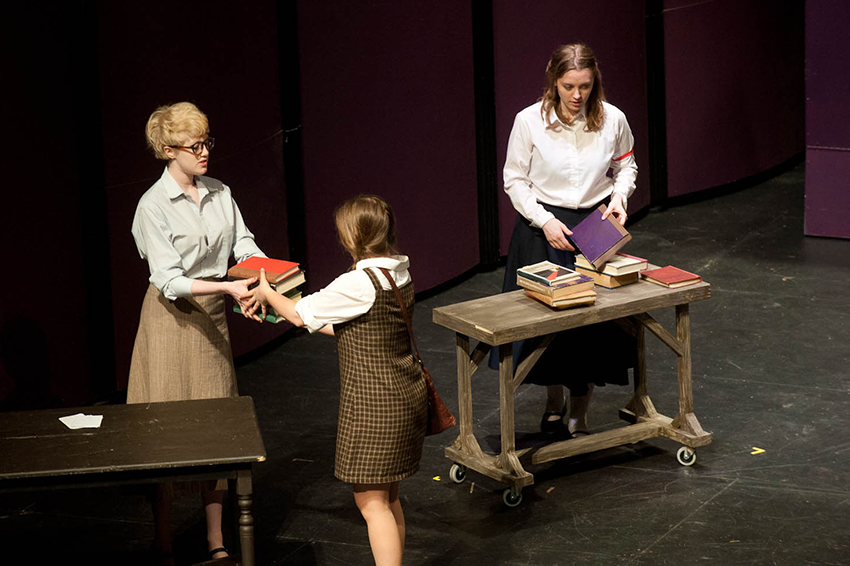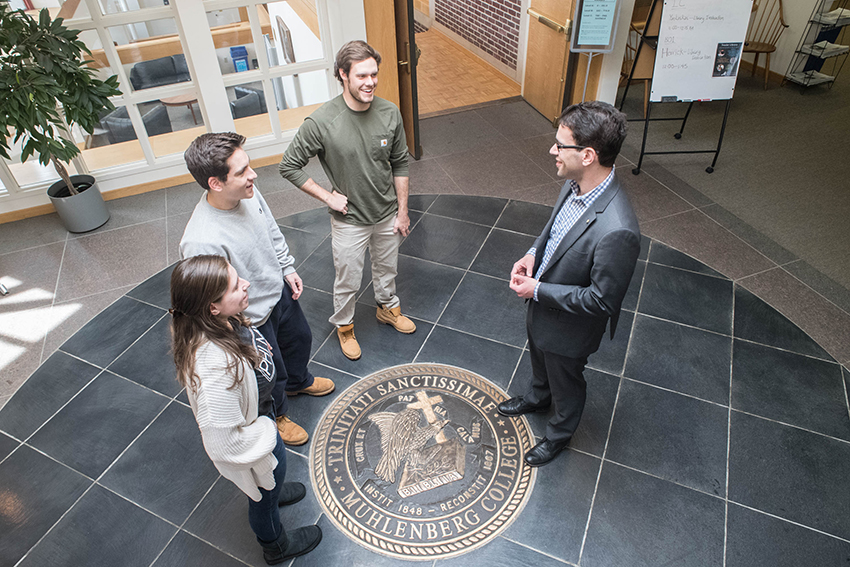Holocaust Program Confronts Modern Hatred, Inspires Service and Hope
Middle school students learn powerful lessons at Youth and Prejudice ConferenceBy: Shelley Drozd Thursday, March 29, 2018 02:32 PM
 Muhlenberg students perform in "The Library" as part of the annual Youth and Prejudice Conference.
Muhlenberg students perform in "The Library" as part of the annual Youth and Prejudice Conference.The day was an exercise in the highest ideals of civic engagement. Young people and their adult supporters sharing provocative, yet respectful, discourse. Lessons about speaking truth to power passed from generation to generation. Reaffirmation that social justice activism is not just alive and well in America, but also young, thoughtful, empowered and impossible to ignore.
Over the weekend of March 24-25, 2018, this scenario played out all across the U.S. in hundreds of March for Our Lives events. But it also happened here at Muhlenberg on March 20, at the Youth and Prejudice Conference sponsored by the Institute for Jewish-Christian Understanding (IJCU).
At both events, the calls to action were equally impassioned: Find strength in numbers. Empathize. Reduce hatred. Stand up for what is right.
A spring snowstorm cancelled two days of school in the Lehigh Valley and days two and three of the conference—a heartbreaking turn of events for a program that the IJCU spends months organizing. However, the weather fates spared Tuesday, allowing 242 students from three middle schools to attend the first day.
The schools filled every orchestra seat in the Dorothy Hess Baker Theatre, sending many other guests and volunteers to the balcony. They were there to see a performance of “The Library,” the story of a young Jewish girl in Nazi Germany. The play was specifically written for the conference and its middle school audience, who can readily identify with the characters and situations.
“This is what the conference has always done so well,” says Pennsylvania State Representative Michael Schlossberg ’05, the day’s keynote speaker. “It connects the lessons of the Holocaust to a modern-day context.”
That context, noted Schlossberg in his address, is a country that’s seen a major spike in racism and hate crimes in recent years.
Pennsylvania State Representative Michael Schlossberg '05 speaks with Muhlenberg students in Trexler Memorial Library.
Showing wisdom beyond their years
The 40-minute play started a day of discussion that began with a Q&A between the actors and the audience. The students then broke out into eight small groups, five of them on campus and three more at neighboring synagogue Keneseth Israel. In them, family members of Holocaust survivors—some of them Muhlenberg students who are grandchildren of survivors—shared their stories.
Muhlenberg student Ben Delin ’21 served as a co-facilitator in one of the sessions, where topics ranged from bullying on social media to gender identity. The Allentown native remembers attending the conference himself in eighth grade. “The students I had in my room were only in sixth grade, but they asked questions I would never have thought to ask back then,” he says.
Schlossberg was similarly struck by the sophistication of his young audience. In light of the recent school shootings, one member asked the mental health advocate how to tell the difference between someone who is mentally ill or just bad. Another student commented that if you stand up to bullies, you invite bullying on yourself. Still another asked how anyone is going to pay attention to them.
“These students are clearly engaged in the issues.The good news is that they want to know what they can do to make a difference, how they can makes things better for everybody,” says Schlossberg.
In his closing remarks, Schlossberg underscored the reason they gathered at Muhlenberg that day, and have for 24 years.
“America’s history—and indeed, the history of the world—is replete with examples of major society gains by minority groups, followed by an ugly backlash of oppression. That backlash is eventually defeated, thanks to the involvement of those willing to stand up and say, ‘enough.’
“Be assured that your generation has our attention. I do believe that things will get better—but not without you. We may need your generation to save us.”
